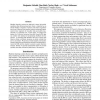66 search results - page 7 / 14 » A Game Theoretical Model for Adversarial Learning |
ECIS
2004
15 years 1 months ago
2004
This article analyzes the impact of a computer simulation (business game) on the users' perceived learning. The theoretical model developed in this paper is derived from the ...
123
click to vote
JAIR
2011
14 years 2 months ago
2011
There has been significant recent interest in game theoretic approaches to security, with much of the recent research focused on utilizing the leader-follower Stackelberg game mo...
115
click to vote
ATAL
2010
Springer
15 years 23 days ago
2010
Springer
We propose Path Disruption Games (PDGs), which consider collaboration between agents attempting stop an adversary from travelling from a source node to a target node in a graph. P...
AAAI
2008
15 years 2 months ago
2008
Machine learning systems are deployed in many adversarial conditions like intrusion detection, where a classifier has to decide whether a sequence of actions come from a legitimat...
101
Voted
ATAL
2011
Springer
13 years 11 months ago
2011
Springer
We develop an algorithm for opponent modeling in large extensive-form games of imperfect information. It works by observing the opponent’s action frequencies and building an opp...

